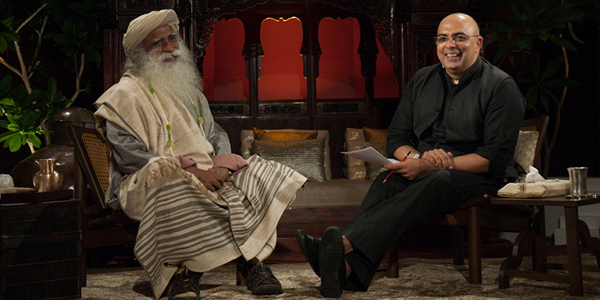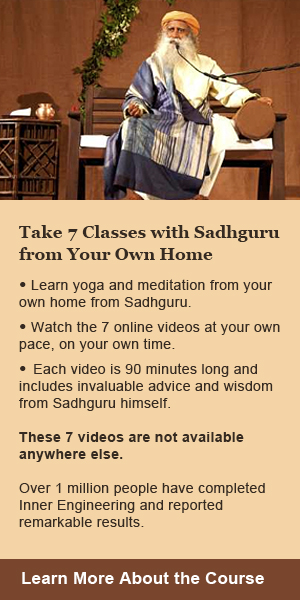Doing What Matters

“Everyone is capable of doing great things, but the society and the families around them are culturing them to do things that are easily achievable.” —Sadhguru
In a recent edition of the “In Conversation with the Mystic” series, Sadhguru met with noted fashion designer Tarun Tahiliani on 5 August 2013 in Delhi. Tarun asks about what it takes to aspire for great things. Sadhguru looks at how the social milieu and education system discourages one from aspiring for what matters most, and instead encourages them to settle for the easy.
Tarun Tahiliani: I was watching your conversation with Shekhar Kapur, and he said about the brahmacharis that they have such incredible energy. Everyone’s threshold is different, so how does one come to a logical conclusion as to how to achieve the balance between aspiring for things and being connected to what really makes us feel good and happy?
Sadhguru: It is a question of choice and of doing what really matters to you. For example tomorrow, I am going on a trek in Tibet. When I do this 120km-trek, the legs will hurt; the bathrooms are bad; we sleep outdoors in all kinds of weather. I could be sleeping in a nice bed, comfortably tucked up, and eat well instead of eating half-cooked camp food. This is not a sacrifice – it’s a choice. Everyone has to make their choice in terms of what matters to them most. Today, a lot of children are choosing what’s easy, not what they want. What you want may not necessarily be easy. If you choose what is easy, it means you don’t want to live. The next level of ease is sleep. The ultimate level of ease is death.
Life is not about difficulty. Whether you experience something as difficult or easy simply depends on how much it matters to you. If something really matters to you, it does not matter how much it hurts, you still want to do it. Trekking in the mountains up there, everything is going to hurt, but if you look up at the peaks and the sky, nothing else matters, even if the legs fall off. Everyone has to choose. You said everyone’s threshold is different – I don’t believe that. Everyone is capable of doing great things, but the society and the families around them are culturing them to do things that are easily achievable. Their idea of achievement is just being one step ahead of a lame person. This is not success. This is sadistic nonsense. The whole idea of wanting to be better than someone else is a very pathetic way to exist.
Tarun Tahiliani: But our entire education is such that you are always marked against others – either you are in front of or behind someone else.
Sadhguru: When I was in school, I never ever opened the report card. I just took it and gave it to my father, because I thought this is a transaction between my teacher and my father. I had no business in this. Anyway I knew I had the most valuable number inside because I always gave empty papers.
Tarun Tahiliani: Shoonya? What’s better than that?
Sadhguru: Yeah. That’s the most valuable number. All other numbers found enhancement only because of a zero.
Right from childhood, people are being conditioned to believe that they have to be better than someone else rather than finding fulfillment to who they are. If you look at a mango tree and a coconut tree, and your idea of being better is being tall, then what you will do with the mango tree is you chop off all the branches except the highest one, hoping that it will grow. It is never going to be a coconut tree – it is only going to be a crippled mango tree. This is what has happened to most human beings. They have become crippled because they are trying to be better than someone else. What is the purpose of an education system like this?
This education system has been evolved at the time of industrialization. When industrialization was happening, their idea of education was to produce cogs in a larger machine. The British devised such an education to some extent for their own citizenry, and especially in the colonies, to produce people who are employable, who can fit in as cogs of a major machine – Her Majesty’s service machine. The moment the British left, we should have relooked at everything, but we left it as it was. Almost all the systems in this country are British, but we are supposed to be free. The very meaning of the freedom movement was lost the moment we adopted all the British systems as they were – from administration to judiciary to education to everything else. Then why did we have to send them out? Unless to create a nation of our own, what is the point fighting and throwing them out? They would have managed it better. Once we threw them out, we should have looked at what kind of a nation we want to create.
What is India for us? This is the longest surviving nationhood on the planet. We never understood nation as a political entity – until the British came. We always understood nation as a certain unity of culture, a certain bonding of consciousness and spiritual ethos that held us together though we are so diverse in every way. Though at many times, we were ruled by over 200 political entities, still everyone recognizes this as Bharat or Hindustan because there was a unity to our existence. Other nations are held together either by language or religion or ethnicity. None of this is true with us. Why did our nation builders not look at what it is that makes India a nation? We just imported everything and imposed it, and this is the outcome.
Editor’s Note: This article is an excerpt from the December 2013 issue of Forest Flower, which is available at the Isha Download Store as a “name your price” download.


